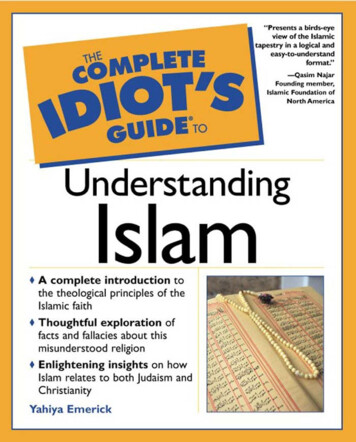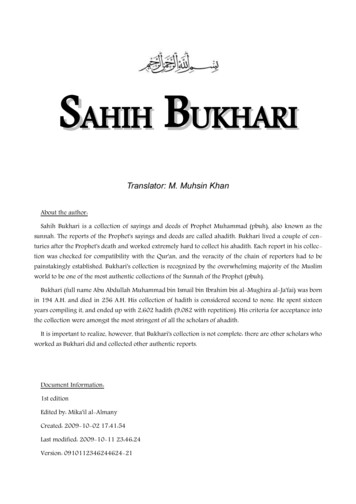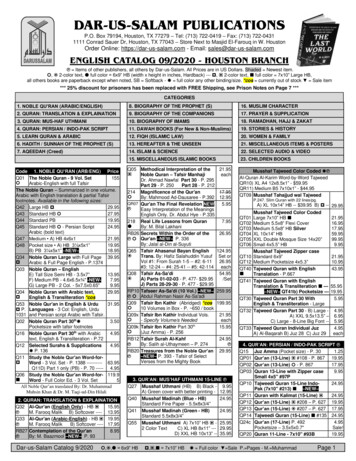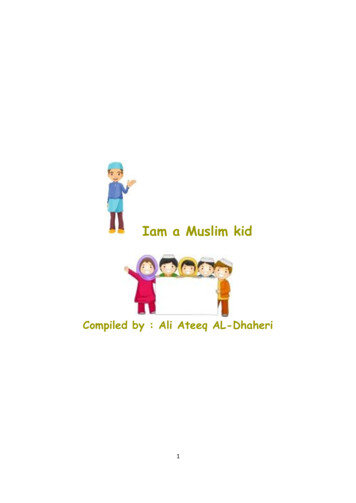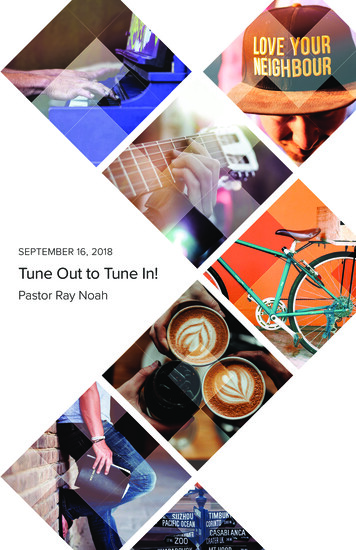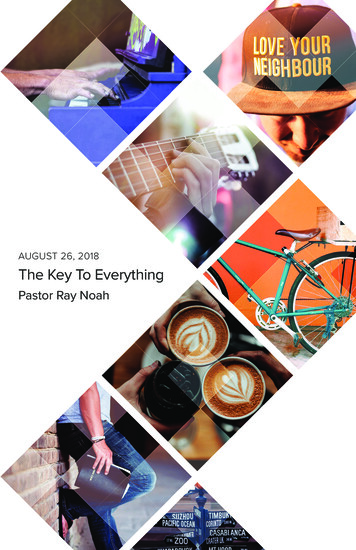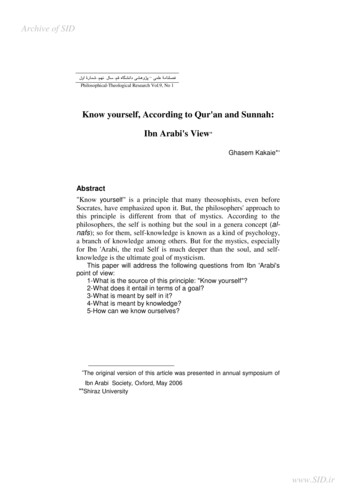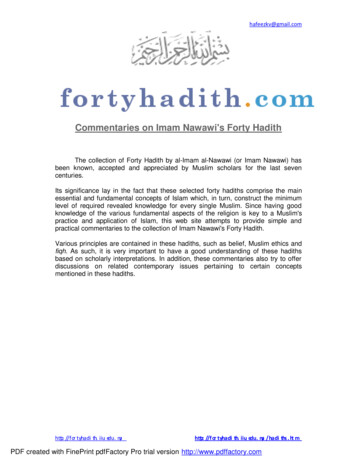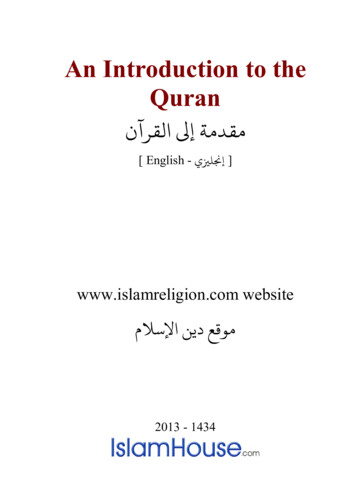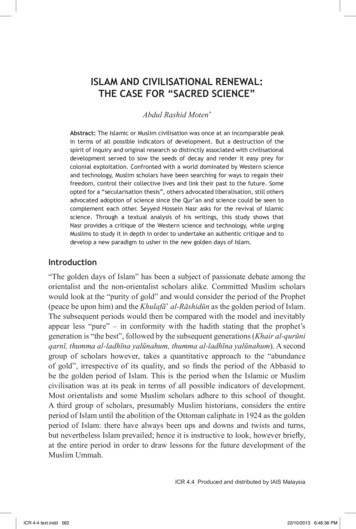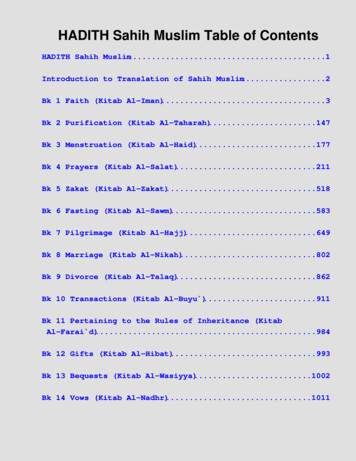
Transcription
HADITH Sahih Muslim Table of ContentsHADITH Sahih Muslim.1Introduction to Translation of Sahih Muslim.2Bk 1 Faith (Kitab Al Iman).3Bk 2 Purification (Kitab Al Taharah).147Bk 3 Menstruation (Kitab Al Haid).177Bk 4 Prayers (Kitab Al Salat).211Bk 5 Zakat (Kitab Al Zakat).518Bk 6 Fasting (Kitab Al Sawm).583Bk 7 Pilgrimage (Kitab Al Hajj).649Bk 8 Marriage (Kitab Al Nikah).802Bk 9 Divorce (Kitab Al Talaq).862Bk 10 Transactions (Kitab Al Buyu ).911Bk 11 Pertaining to the Rules of Inheritance (KitabAl Farai d).984Bk 12 Gifts (Kitab Al Hibat).993Bk 13 Bequests (Kitab Al Wasiyya).1002Bk 14 Vows (Kitab Al Nadhr).1011
HADITH Sahih Muslim Table of ContentsBk 15 Oaths (Kitab Al Aiman).1015Bk 16 Pertaining to the Oath, for Establishing theResponsibility.1033Bk 17 Pertaining to Punishments Prescribed by Islam(Kitab Al Hudud).1049Bk 18 Pertaining to Judicial Decisions (KitabAl Aqdiyya).1068Bk 19 Jihad and Expedition (Kitab Al Jihad wa'l Siyar).1080Bk 20 Government (Kitab Al Imara).1161Bk 21 Games and the Animals.1228Bk 22 Sacrifices (Kitab Al Adahi).1247Bk 23 Drinks (Kitab Al Ashriba).1266Bk 24 Pertaining to Clothes and Decoration.1318Bk 25 General Behaviour (Kitab Al Adab).1352Bk 26 Salutations and Greetings (Kitab As Salam).1367Bk 27 Concerning the Use of Correct Words.1411Bk 28 Poetry (Kitab Al Sh ir).1415Bk 29 Vision (Kitab Al Ruya).1417
HADITH Sahih Muslim Table of ContentsBk 30 Pertaining to the Excellent Qualities.1426Bk 31 Pertaining to the Merits of the Companions.1480Bk 32 Virtue, Good Manners.1572Bk 33 Destiny (Kitab ul Qadr).1616Bk 34 Knowledge (Kitab Al Ilm).1633Bk 35 Pertaining to the Remembrance of Allah,.1639Bk 36 Heart Melting Traditions (Kitab Al Riqaq).1670Bk 37 Pertaining to Repentance and Exhortation toRepentance (Kitab Al Tauba).1674Book 38: Pertaining To The Charateristics Of TheHypocrites.1706Bk 39 Giving Description of the Day of Judgement,.1713Bk 40 Pertaining to Paradise, Its Description,.1732Bk 41 Pertaining to the Turmoil and Portents of theLast Hour.1757Bk 42 Pertaining to Piety and Softening of Hearts(Kitab Al Zuhd wa Al Raqa'iq).1805Bk 43 Commentary (Kitab Al Tafsir).1838
HADITH Sahih MuslimConvertedbyBill ithweb.com
Introduction to Translation of Sahih MuslimIn the Name of Allah, the Most Compassionate, the MostMerciful Sahih Muslim is a collection of sayings and deeds ofProphet Muhammad (pbuh) (also known as the sunnah). Thereports of the Prophet's sayings and deeds are called ahadith.Muslim lived a couple of centuries after the Prophet's deathand worked extremely hard to collect his ahadith. Each reportin his collection was checked for compatibility with theQur'an, and the veracity of the chain of reporters had to bepainstakingly established. Muslim's collection is recognizedby the overwhelming majority of the Muslim world to be one ofthe most authentic collections of the Sunnah of the Prophet(pbuh). Muslim (full name Abul Husain Muslim bin al Hajjajal Nisapuri) was born in 202 A. H. and died in 261 A. H. Hetravelled widely to gather his collection of ahadith,including to Iraq, Saudi Arabia, Syria, and Egypt. Out of300,000 ahadith which he evaluated, only 4,000 approximately(including multiple hadith in a single one i. e. multiplequotations) were extracted for inclusion into his collectionbased on stringent acceptance criteria. Muslim was a studentof Bukhari. It is important to realize, however, that Muslim'scollection is not complete: there are other scholars whoworked as Muslim did and collected other authentic reports.The translation of Sahih Muslim found here is complete!
Bk 1 Faith (Kitab Al Iman)Chapter 1:.Bk 1, Number 0001:It is narrated on the authority of Yahya b. Ya'mur that thefirst man who discussed about Qadr (Divine Decree) in Basrawas Ma'bad al Juhani. I along with Humaid b. 'Abdur RahmanHimyari set out for prilgrimage or for 'Umrah and said: Shouldit so happen that we come into contact with one of theCompanions of the Messenger of Allah (peace be upon him) weshall ask him a bout what is talked about Taqdir (DivisionDecree). Accidentally we came across Abdullah ibn Umar ibnal Khattab, while he was entering the mosque. My companion andI surrounded him. One of us (stood) on his right and the otherstood on his left. I expected that my companion wouldauthorize me to speak. I therefore said: Abu Abdur Rahman!there have appeared some people in our land who recite theHoly Qur'an and pursue knowledge. And then after talking abouttheir affairs, added: They (such people) claim that there isno such thing as Divine Decree and events are not predestined.He (Abdullah ibn Umar) said: When you happen to meet suchpeople tell them that I have nothing to do with them and theyhave nothing to do with me. And verily they are in no wayresponsible for my (belief). Abdullah ibn Umar swore by Him(the Lord) (and said): If any one of them (who does notbelieve in the Divine Decree) had with him gold equal to thebulk of (the mountain) Uhud and then, it (in the way ofAllah), Allah would not accept it unless he affirmed his faithin Divine Decree. He further said: My father, Umar ibnal Khattab, told me: One day we were sitting in the company ofAllah's Apostle (peace be upon him) when there appeared beforeus a man dressed in pure white clothes, his hairextraordinarily black. There were no signs of travel on him.None amongst us recognized him. At last he sat with theApostle (peace be upon him) He knelt before him placed his
palms on his thighs and said: Muhammad, inform me aboutal Islam. The Messenger of Allah (peace be upon him) said:Al Islam implies that you testify that there is no god butAllah and that Muhammad is the messenger of Allah, and youestablish prayer, pay Zakat, observe the fast of Ramadan, andperform pilgrimage to the (House) if you are solvent enough(to bear the expense of) the journey. He (the inquirer) said:You have told the truth. He (Umar ibn al Khattab) said: Itamazed us that he would put the question and then he wouldhimself verify the truth. He (the inquirer) said: Inform meabout Iman (faith). He (the Holy Prophet) replied: That youaffirm your faith in Allah, in His angels, in His Books, inHis Apostles, in the Day of Judgment, and you affirm yourfaith in the Divine Decree about good and evil. He (theinquirer) said: You have told the truth. He (the inquirer)again said: Inform me about al Ihsan (performance of gooddeeds). He (the Holy Prophet) said: That you worship Allah asif you are seeing Him, for though you don't see Him, He,verily, sees you. He (the enquirer) again said: Inform meabout the hour (of the Doom). He (the Holy Prophet) remarked:One who is asked knows no more than the one who is inquiring(about it). He (the inquirer) said: Tell me some of itsindications. He (the Holy Prophet) said: That the slave girlwill give birth to her mistress and master, that you will findbarefooted, destitute goat herds vying with one another in theconstruction of magnificent buildings. He (the narrator, Umaribn al Khattab) said: Then he (the inquirer) went on his waybut I stayed with him (the Holy Prophet) for a long while. Hethen, said to me: Umar, do you know who this inquirer was? Ireplied: Allah and His Apostle knows best. He (the HolyProphet) remarked: He was Gabriel (the angel). He came to youin order to instruct you in matters of religion.Bk 1, Number 0002:It is narrated on the authority of Yahya b. Ya'mur that whenMa'bad discussed the problem pertaining to Divine Decree, werefuted that. He (the narrator) said: I and Humaid b.Abdur Rahman Himyari argued. And they carried on theconversation about the purport of the hadith related by Kahmas
and its chain of transmission too, and there is some variationof words.Bk 1, Number 0003:It is narrated on the authority of Yahya b. Ya'mur and Humaidb. 'Abdur Rahman that they said: We met Abdullah b. 'Umar andwe discussed about the Divine Decree, and what they talkedabout it and he narrated the hadith that has been transmittedby 'Umar (may Allah be pleased with him) from the Apostle (maypeace be upon him). There is a slight variation in that.Chapter 2: WHAT IS IMAN AND WHAT ARE ITS CHARACTERISTICSBk 1, Number 0004:Abu Huraira reported: One day the Messenger of Allah (maypeace be upon him) appeared before the public that a man cameto him and said: Prophet of Allah, (tell me) what is Iman.Upon this he (the Holy Prophet) replied: That you affirm yourfaith in Allah, His angels, His Books, His meeting, HisMessengers and that you affirm your faith in the Resurrectionhereafter. He (again) said: Messenger of Allah, (tell me) whatdoes al Islam signify. He (the Holy Prophet) replied: Al Islamsignifies that you worship Allah and do not associate anythingwith Him and you establish obligatory prayer and you pay theobligatory poor rate (Zakat) and you observe the fast ofRamadan. He (the inquirer) again said: Messenger of Allah,what does al Ihsan imply? He (the Holy Prophet) replied: Thatyou worship Allah as if you are seeing Him, and in case youfail to see Him, then observe prayer (with this idea in yourmind) that (at least) He is seeing you. He (the inquirer )again said: Messenger of Allah, when would there be the hour(of Doom)? He (the Holy Prophet) replied: The one who is askedabout it is no better informed than the inquirer. I, however,narrate some of its signs (and these are): when the slave girlwill give birth to he master, when the naked, barefooted wouldbecome the chiefs of the people these are some of the signsof (Doom). (Moreover) when the shepherds of the black (camels)would exult themselves in buildings, this is one of the signsof (Doom). (Doom) is one of the five (happenings wrapped inthe unseen) which no one knows but Allah. Then he (theMessenger of Allah) recited (the verse):" Verily Allah! with
Him alone is the knowledge of the hour and He it is Who sends(down the rain) and knows that which is in the wombs and noperson knows whatsoever he shall earn tomorrow, and a personknows not in whatsoever land he shall die. Verily Allah isKnowing, Aware. He (the narrator, Abu Huraira) said: Then theperson turned back and went away. The Messenger of Allah (maypeace be upon him) said: Bring that man back to me. They (theCompanions of the Holy Prophet present there) went to bringhim back, but they saw nothing there. Upon this the Messengerof Allah remarked: he was Gabriel, who came to teach thepeople their religion.Bk 1, Number 0005:This hadith is narrated to us on the authority of Muhammad b.'Abdullah b. Numair, on the authority of Muhammad b. Bishr, onthe authority of Abd Hayyan al Taymi with the exception thatin this narration (instead of the words (Iza Waladat al'amahrabbaha), the words are (Iza Waladat al'amah Ba'laha), i, e,when slave girl gives birth to her master.Bk 1, Number 0006:It is narrated on the authority of Abu Huraira that theMessenger of Allah (may peace be upon him) said: Ask me (aboutmatters pertaining to religion), but they (the Companions ofthe Holy Prophet) were too much overawed out of profoundrespect for him to ask him (anything). In the meanwhile a mancame there, and sat near his knees and said: Messenger ofAllah, what al lslam is? to which he (the Holy Prophet)replied: You must not associate anything with Allah, andestablish prayer, pay the poor rate (Zakat) and observe (thefasts) of Ramadan. He said: You (have) told the truth. He(again) said: Messenger of Allah, what al Iman (the faith) is?He (the Holy Prophet) said: That you affirm your faith inAllah, His angels, His Books, His meeting, His Apostles, andthat you believe in Resurrection and that you believe in Qadr(Divine Decree) in all its entirety, He (the inquirer) said:You (have) told the truth. He (again) said: Messenger ofAllah, what al Ihsan is? Upon this he (the Holy Prophet) said:(Al Ihsan implies) that you fear Allah as if you are seeingHim, and though you see Him not, verily He is seeing you. He
(the inquirer) said: You (have) told the truth. He (theinquirer) said: When there would be the hour (of Doom)? (Uponthis) he (the HolyProphet said: The one who is being askedabout it is no better informed than the inquirer himself. I,however, narrate some of its signs (and these are): when yousee a slave (woman) giving birth to her master that is oneof the signs of (Doom) ; when you see barefooted, naked, deafand dumb (ignorant and foolish persons) as the rulers of theearth that is one of the signs of the Doom. And when you seethe shepherds of black camels exult in buildings that is oneof the signs of Doom. The (Doom) is one of the five things(wrapped) in the unseen. No one knows them except Allah. Then(the Holy Prophet) recited (the folowing verse):" VerilyAllah! with Him alone is the knowledge of the hour and He itis Who sends down the rain and knows that which is in thewombs and no person knows whatsoever he shall earn on morrowand a person knows not in whatsoever land he shall die. VerilyAllah is Knowing, Aware. He (the narrator, Abu Huraira) said:Then the person stood up an (made his way). The Messenger ofAllah (may peace be upon him) said: Bring him back to me. Hewas searched for, but they (the Companions of the HolyProphet) could not find him. The Messenger of Allah (may peacebe upon him) thereupon said: He was Gabriel and he wanted toteach you (things pertaining to religion) when you did not ask(them yourselves).Chapter 3: ON PRAYER (SALAT) WHICH IS ONE OF THE PILLARS OFISLAMBk 1, Number 0007:It is reported on the authority of Talha b. 'Ubaidullah that aperson with dishevelled hair, one of the people of Nejd, cameto the Messenger of Allah (may peace be upon him). We heardthe humming of his voice but could not fully discern what hehad been saying, till he came nigh to the Messenger of Allah(may peace be upon him). It was then (disclosed to us) that hewas asking questions pertaining to Islam. The Messenger ofAllah (may peace be upon him) said: Five prayers during theday and the night. (Upon this he said: Am I obliged to say anyother (prayer) besides these? He (the Holy Prophet, ) said:
No, but whatever you observe voluntarily, out of your own freewill, and the fasts of Ramadan. The inquirer said: Am Iobliged to do anything else besides this? He (the HolyProphet) said: No, but whatever you do out of your own freewill. And the Messenger of Allah told him about the Zakat(poor rate). The inquirer said: Am I obliged to pay anythingelse besides this? He (the Holy Prophet) said: No, butwhatever you pay voluntarily out of your own free will. Theman turned back and was saying: I would neither make anyaddition to this, nor will decrease anything out of it. TheProphet remarked: He is successful, if he is true to what heaffirms.Bk 1, Number 0008:Another hadith, the like of which has been narrated by Malik(b. Anas) (and mentioned above) is also reported by Talha b.'Ubaidullah, with the only variation that the Holy Prophetremarked: By his father, he shall succeed if he were true (towhat he professed), or: By his father, he would enter heavenif he were true (to what he professed).Chapter 4: PERTAINING TO FAITH IN ALLAHBk 1, Number 0009:It is reported on the authority of Anas b. Malik that he said:We were forbidden that we should ask anything (without thegenuine need) from the Holy Prophet. It, therefore, pleased usthat an intelligent person from the dwellers of the desertshould come and asked him (the Holy Prophet) and we shouldlisten to it. A man from the dwellers of the desert came (tothe Holy Prophet) and said: Muhammad, your messenger came tous and told us your assertion that verily Allah had sent you(as a prophet). He (the Holy Prophet) remarked: He told thetruth. He (the bedouin) said: Who created the heaven? He (theHoly Prophet) replied: Allah. He (the bedouin again) said: Whocreated the earth? He (the Holy Prophet) replied: Allah. He(the bedouin again) said: Who raised these mountains and whocreated in them whatever is created there? He (the HolyProphet) replied: Allah. Upon this he (the bedouin) remarked:By Him Who created the heaven and created the earth and raisedmountains thereupon, has Allah (in fact) sent you? He (the
Holy Prophet) said: Yes. He (the bedouin) said: Your messengeralso told us that five prayers (had been made) obligatory forus during the day and the night. He (the Holy Prophet)remarked: He told you the truth. He (the bedouin) said: By HimWho sent you, is it Allah Who ordered you about this (i. e.prayers)? He (the Holy Prophet) said: Yes. He (the bedouin)said: Your messenger told us that Zakat had been madeobligatory in our riches. He (the Holy Prophet) said. He hastold the truth. He (the bedouin) said: By Him Who sent you (asa prophet), is it Allah Who ordered you about it (Zakat)? He(the Holy Prophet) said: Yes. He (the bedouin) said: Yourmessenger told us that it had been made obligatory for us tofast every year during the month of Ramadan. He (the HolyProphet) said: He has told the truth. He (the bedouin) said:By Him Who sent you (as a prophet), is it Allah Who orderedyou about it (the fasts of Ramadan)? He (the Holy Prophet)said: Yes. He (the bedouin) said: Your messenger also told usthat pilgrimage (Hajj) to the House (of Ka'bah) had been madeobligatory for him who is able to undertake the journey to it.He (the Holy Prophet) said: Yes. The narrator said that he(the bedouin) set off (at the conclusion of this answer, butat the time of his departure) remarked: 'By Him Who sent youwith the Truth, I would neither make any addition to them norwould I diminish anything out of them. Upon this the HolyProphet remarked: If he were true (to what he said) he mustenter Paradise.Bk 1, Number 0010:It is narrated on the authority of Thabit that Anas said: Wewere forbidden in the Holy Qur'an that we should ask aboutanything from the Messenger of Allah (may peace be upon him)and then Anas reported the hadith in similar words.Chapter 5: CONCERNING IMAN BY WHICH A PERSON WOULD ENTERHEAVENBk 1, Number 0011:It is narrated on the authority of Abu Ayyub Ansari that onceduring the journey of the Holy Prophet (may peace of Allah beupon him) a bedouin appeared before him and caught hold of thenosestring of his she camel and then said, Messenger of Allah
(or Muhammad), inform me about that which takes me near toParadise and draws me away from the Fire (of Hell). He (thenarrator) said: The Prophet (may peace be upon him) stoppedfor a while and cast a glance upon his companions and thensaid: He was afforded a good opportunity (or he had beenguided well). He (the Holy Prophet) addressing the bedouinsaid: (Repeat) whatever you have uttered. He (the bedouin)repeated that. Upon this the Apostle (may peace be upon him)remarked: The deed which can draw you near to Paradise andtake you away from Hell is, that you worship Allah andassociate none with Him, and you establish prayer and payZakat, and do good to your kin. After having uttered thesewords, the Holy Prophet asked the bedouin to release thenosestring of his she camel.Bk 1, Number 0012:This hadith is transmitted by Muhammad b. Hatim on theauthority of Abu Ayyub Ansari.Bk 1, Number 0013:It is narrated on the authority of Abu Ayyub that a man cameto the Prophet (may peace be upon him) and said: Direct me toa deed which draws me near to Paradise and takes me away fromthe Fire (of Hell). Upon this he (the Holy Prophet) said: Youworship Allah and never associate anything with Him, establishprayer, and pay Zakat, and do good to your kin. When he turnedhis back, the Messenger of Allah (may peace be upon him)remarked: If he adheres to what he has been ordered to do, hewould enter Paradise.Bk 1, Number 0014:It is reported on the authority of Abu Huraira that a bedouincame to the Messenger of Allah (may peace be upon him) andsaid: Messenger of Allah, direct me to a deed by which I maybe entitled to enter Paradise. Upon this he (the Holy Prophet)remarked: You worship Allah and never associate anything withHim, establish the obligatory prayer, and pay the Zakat whichis incumbent upon you, and observe the fast of Ramadan. He(the bedouin) said: By Him in Whose hand is my life, I willnever add anything to it, nor will I diminish anything fromit. When he (the bedouin) turned his back, the Prophet (may
peace be upon him) said: He who is pleased to see a man fromthe dwellers of Paradise should catch a glimpse of him.Bk 1, Number 0015:It is narrated on the authority of Jabir that Nu'man b. Qaufalcame to the Holy Prophet (may peace be upon him) and said:Would I enter Paradise if I say the obligatory prayers anddeny myself that which is forbidden and treat that as lawfulwhat has been made permissible (by the Shari'ah)? The HolyProphet (may peace be upon him) replied in the affirmative.Bk 1, Number 0016:A similar hadith is narrated on Jabir's authority in which thefollowing words are added: I will do nothing more.Bk 1, Number 0017:It is narrated on the authority of Jabir that a man once saidto the Messenger of Allah (may peace be upon him): Shall Ienter Paradise in case I say the obligatory prayers, observethe (fasts) of Ramadan and treat that as lawful which has beenmade permissible (by the Shari'ah) and deny myself that whatis forbidden, and make no addition to it? He (the HolyProphet) replied in the affirmative. He (the inquirer) said:By Allah, I would add nothing to it.Chapter 6: CONCERNING THE SAYING OF THE APOSTLE: ISLAM ISFOUNDED ON FIVE (FUNDAMENTS)Bk 1, Number 0018:It is narrated on the authority of ('Abdullah) son of Umar(may Allah be pleased with them) that the Holy Prophet (maypeace of Allah be upon him) said: (The superstructure of)al Islam is raised on five (pillars), i. e. the oneness ofAllah, the establishment of prayer, payment of Zakat, the,fast of Ramadan, Pilgrimage (to Mecca). A person said (to'Abdullah b. Umar the narrator): Which of the two precedes theother Pilgrimage or the fasts of Rarnadan? Upon this he (thenarrator) replied: No (it is not the Pilgrimage first) but thefasts of Ramadan precede the Pilgrimage.Bk 1, Number 0019:It is narrated on the authority of ('Abdullah) son of 'Umar,that the Holy Prophet (may peace of Allah be upon him) said:(The superstructure of) al Islam is raised on five (pillars),
i. e. Allah (alone) should be worshipped, and (all other gods)beside Him should be (categorically) denied. Establishment ofprayer, the payment of Zakat, Pilgrimage to the House, and thefast of Ramadan (are the other obligatory acts besides thebelief in the oneness of Allah and denial of all other gods).Bk 1, Number 0020:It is narrated on the authority of 'Abdullah son of 'Umar thatthe Messenger of Allah (may peace be upon him) said: (Thesuperstructure of) al Islam is raised on five (pillars),testifying (the fact) that there is no god but Allah, thatMuhammad is His bondsman and messenger, and the establishmentof prayer, payment of Zakat, Pilgrimage to the House (Ka'ba)and the fast of Ramadan.Bk 1, Number 0021:It is reported on the authority of Ta'us that a man said to'Abdullah son of 'Umar (may Allah be pleased with him). Whydon't you carry out a military expedition? Upon which hereplied: I heard the messenger of Allah (may peace be uponhim) say: Verily, al Islam is founded on five (pillars):testifying the fact that there is no god but Allah,establishment of prayer, payment of Zakat, fast of Ramadan andPilgrimage to the House.Chapter 7: RELATING TO THE COMMAND FOR BELIEF IN ALLAH AND HISPROPHET AND THE LAWS OF ISLAM AND INVITING (PEOPLE TO) THEMBk 1, Number 0022:It is narrated on the authority of Ibn 'Abbas that adelegation of Abdul Qais came to the Messenger of Allah (maypeace be upon him) and said: Messenger of Allah, verily oursis a tribe of Rabi'a and there stand between you and us theunbelievers of Mudar and we find no freedom to come to youexcept in the sacred month. Direct us to an act which weshould ourselves perform and invite those who live beside us.Upon this the Prophet remarked: I command you to do fourthings and prohibit you against four acts. (The four deedswhich you are commanded to do are): Faith in Allah, and thenhe explained it for them and said: Testifying the fact. thatthere is no god but Allah, that Muhammad is the messenger ofAllah, performance of prayer, payment of Zakat, that you pay
Khums (one fifth) of the booty fallen to your lot, and Iprohibit you to use round gourd, wine jars, wooden pots orskins for wine. Khalaf b. Hisham has made this addition in hisnarration: Testifying the fact that there is no god but Allah,and then he with his finger pointed out the oneness of theLord.Bk 1, Number 0023:Abu Jamra reported: I was an interpreter between Ibn Abbas andthe people, that a woman happened to come there and askedabout nabidh or the pitcher of wine. He replied: A delegationof the people of 'Abdul Qais came to the Messenger of Allah(may peace be upon him). He (the Holy Prophet) asked thedelegation or the people (of the delegation about theiridentity). They replied that they belonged to the tribe ofRabi'a. He (the Holy Prophet) welcomed the people or thedelegation which were neither humiliated nor put to shame.They (the members of the delegation) said: Messenger of Allah,we come to you from a far off distance and there lives betweenyou and us a tribe of the unbelievers of Mudar and, therefore,it is not possible for us to come to you except in the sacredmonths. Thus direct us to a clear command, about which weshould inform people beside us and by which we may enterheaven. He (the Holy Prophet) replied: I command you to dofour deeds and forbid you to do four (acts), and added: Idirect you to affirm belief in Allah alone, and then askedthem: Do you know what belief in Allah really implies? Theysaid: Allah and His Messenger know best. The Prophet said: Itimplies testimony to the fact that there is no god but Allah,and that Muhammad is the messenger of Allah, establishment ofprayer, payment of Zakat, fast of Ramadan, that you payone fifth of the booty (fallen to your lot) and I forbid youto use gourd, wine jar, or a receptacle for wine. Shu'basometimes narrated the word naqir (wooden pot) and sometimesnarrated it as muqayyar. The Holy Prophet also said: Keep itin your mind and inform those who have been left behind.Bk 1, Number 0024:There is another hadith narrated on the authority of Ibn Abbas(the contents of which are similar to the one) narrated by
Shu'ba in which the Holy Prophet (may peace be upon him) said:I forbid you to prepare nabidh in a gourd, hollowed block ofwood, a varnished jar or receptacle. Ibn Mu'adh made thisaddition on the authority of his father that the Messenger ofAllah said to Ashajj, of the tribe of 'Abdul Qais: You possesstwo qualities which are liked by Allah: insight anddeliberateness.Bk 1, Number 0025:It is reported on the authority of Qatada that one among thedelegates of the 'Abdul Qais tribe narrated this tradition tohim. Sa'id said that Qatada had mentioned the name of AbuNadra on the authority of Abu Sa'id Khudri who narrated thistradition: That people from the tribe of 'Abdul Qais came tothe Messenger of Allah (may peace be upon him) and said:Messenger of Allah, we belong to the tribe of Rabi'a and therelive between you and us the unbelievers of the Mudar tribe andwe find it impossible to come to you except in the sacredmonths; direct us to a deed which we must communicate to thosewho have been left behind us and by doing which we may enterheaven. Upon this the Messenger of Allah (may peace be uponhim) said: I enjoin upon you four (things) and forbid you todo four (things): worship Allah and associate none with Him,establish prayer, pay Zakat, and observe the fast of Ramadan,and pay the fifth part out of the booty. And I prohibit youfrom four (things): dry gourds, green coloured jars, hollowedstumps of palm trees, and receptacles. They (the members ofthe delegation) said: Do you know what al naqir is? Hereplied: Yes, it is a stump which you hollow out and in whichyou throw small dates. Sa'id said: He (the Holy Prophet) usedthe word tamar (dates). (The Holy Prophet then added): Thenyou sprinkle water over it and when its ebullition subsides,you drink it (and you are so intoxicated) that one amongstyou, or one amongst them (the other members of your tribe, whowere not present there) strikes his cousin with the sword. He(the narrator) said: There was a man amongst us who hadsustained injury on this very account due to (intoxication),and he told that he tried to conceal it out of shame from theMessenger of Allah (may peace be upon him). I, however,
inquired from the Messenger of Allah (it we discard thoseutensils which you have forbidden us to use), then what typeof vessels should be used for drink? He (the Holy Prophet)replied: In the waterskin the mouths of which are tied (with astring). They (again) said: Pro
affirm your faith in Allah, in His angels, in His Books, in His Apostles, in the Day of Judgment, and you affirm your faith in the Divine Decree about good and evil. He (the inquirer) said: You have told the truth. He (the inquirer) again said: Inform me about al Ihsan (performance of good
